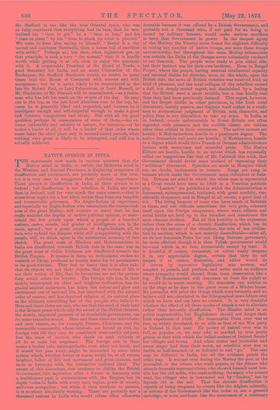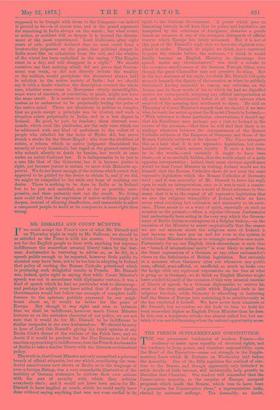NATIVE OPINION IN INDLi.
ME statements now made in various quarters that the Native mind in India, or rather, the Mahratta mind in
the Western and Central Provinces, is displaying symptoms of disaffection and excitement, are probably more or less true, but it is very easy to exaggerate their political importance. There always is disaffection in India, as there always is in Ireland ; but disaffection is not rebellion in India, any more than in Ireland, and for very much the same reason,—that it arises from regret for a lost ideal, rather than from any tangible and irremovable grievance. No Anglo-Indian of experience, and especially no Anglo-Indian who remembers the unexpected-
ness of the great Mutiny, will venture to assert that he has really sounded the depths of native political opinion, or ascer- tained the few points upon which a people of a hundred nations, castes, creeds, and grades of intelligence are, in the main, agreed ; but a great number of Anglo-Indians, all, in fact, who uphold the Empire while still sympathising with the people, will, we think, agree in the substantial accuracy of this sketch. The great mass of Hindoos and Mohammedans in India are disaffected towards British rule in the same way as the great mass of Celtic Irishmen are disaffected towards the British Empire. It creates in them no enthusiasm, evokes no warmth of liking, produces no hearty desire for its permanence or its good-fortune. They feel or fancy that it is alien rale, that its objects are not their objects, that its notion of life is not their notion of life, that its favourites are not the persons they would select for loyalty. The foreign rule has, in their minds, interrupted an older and brighter civilisation, has de- graded ancient eminences, has taken the colour and glow and excitement out of national life, has interfered with the natural order of society, and has deprived religion of its natural place as the ultimate controlling law of the peoples who believe it. Here and there there are men who see that the need of their land is the Roman peace which only the sword of the British General, the steady, impartial pressure of an irresistible government, can for some centuries secure. Here and there there are individuals, and even classes, as, for example, Parsees, Christians, and the mercantile community, whose interests are bound up with the foreign rule till they may be considered trustworthy subjects. But the mass of natives who think on such subjects at all do at most but acquiesce. The foreign rule to them seems a leaden rule, unsympathetic, even when not harsh, and if would but pass away, might be succeeded by some other system which, whether better or worse, would be, at all events, brighter, fuller of life and movement and great chances, and more in harmony with the instinctive national ideal. The extent of this discontent, this tendency to dislike the British Government, this aspiration after a future in harmony with a traditionary past, is conterminous with the Empire, but its depth varies in India with every race, region, grade of society, and even occupation ; but while it rises nowhere to passion, it is nowhere absolutely wanting. There are probably not a
thousand natives in India who would refuse of otherwise
desirable because it was offered by a British Government, and probably not a thousand who, if not paid for so doing or bound by military honour, would make serious sacrifices to keep that Government in power. In the deepest agony of the Mutiny, the Viceroy never found the slightest difficulty in raising any number of native troops, nor were those troops untrustworthy, but throughout the same Mutiny information was outside the Delta of the Ganges never voluntarily rendered to our Generals. The people were ready to join either side, but their instinct was for their own brethren. Even in Bengal Proper, where the people, having unusual intellectual capacity and unusual dislike for disorder, were, on the whole, upon the British side, the news of British victories was received with no kind of pleasure, and the total collapse of the rebellion caused a dull but deeply seated regret, not diminished by a feeling that the British were a more terrible, but a less kindly race than they had been previously deemed. This regret, however, and the deeper dislike in other provinces, is, like Irish rural discontent, mainly passive, and displays itself rather in a readi- ness to acrimonious judgment of British acts, character, and policy than in any disposition to take up arms. In India, as in Ireland, events unfavourable to Great Britain are often regarded with pleasure, and the audible classes are seldom other than critical in their utterances. The native orators are hostile; if Mohammedans, hostile to a passionate degree. The native dramatists and poets are hostile ; if Northerners, hostile to a degree which would drive French or German administrators furious with annoyance and wounded. pride. The Native Editors are hostile, hostile to an extent which has repeatedly called out suggestions like that of Mr. Caldwell this week, that Government should devise some method of repressing their "seditious" utterances. Speeches are made in Mosques which are, no doubt, incitements to treason. Songs are sung in bazaars which make the Government seem ridiculous or hate- ful. Dramas are acted in which the white man is represented as a Croat would have been in 1859 in a Venetian patriotic play. "Leaders" are published in which the Administration is denounced, misrepresented, traduced, with great acerbity, con- siderable eloquence, and in Bengal at all events, a good deal of wit. The biting humour of races who have much of Rabelais in them, and can ridicule sometimes the very gods, exhausts itself upon the foreign conquerors, whose ways, officers, and social habits are held up to the broadest and sometimes the most obscene derision. But all this hostility is the expression rather than the cause of a chronic disaffection, which has its origin in the nature of the situation, the rule_ of one civilisa- tion by another, which is not entirely cliacreditable—after all, we do not denounce Poles for not liking German goverment, far more efficient though it is than Polish government would be—and which is, we fear, irremovable except by time. It is doubtful if orator, dramatist, or editor really deepens it in any appreciable degree, certain that they do not deepen it as orator, dramatist, and editor would do if driven by repressive legislation into secrecy, and tempted to preach, and perform, and write amid an audience whose sympathy would shroud them from observation like a fog. No Mohammedan will denounce us from the pulpit as he would do in secret meeting. No dramatist can satirise us on the stage as he does in the great room of a Hindoo house. No journalist will print the things which were formerly, and we believe still are, circulated in the lithographed news-letters over which we have and can have no controL It is very doubtful whether the effect of all these modes of attack is not to alleviate rather than intensify disaffection. The Hindoo mind is on points impenetrable, but Englishmen should not forget their Irish experience of 1848. No treasonable Press ever was so free, so widely circulated, or so able as that of the War party in Ireland in that year. No poetry of hatred ever was so full, so popular, or, we may add, so marked by true poetic genius as that with which the ballad-makers of Ireland flooded her villages and towns. And when orator and journalist and sweet singer had done their worst, no rebellion ever was so feeble, so half-hearted, or so deficient in real "go." The case may be different in India, but all the evidence points the other way. It was not even during the Mutiny the poet or the journalist, or the citizen who reads papers, or the ficineur who attends dramatic representations, who showed himself most hos- tile, but the old noble, who reads nothing, the aepoy who cannot read, the villager who is instructed not by. "leaders," but by legends old as the soil. That the chronic disaffection is capable of being deepened by events like, he Afghan calamity, or actions of the Government like the order to use a greased cartridge, or even accidents like the recurrenoe, of a centenary
supposed to be fraught with doom to the Company—as indeed it proved to be—is of course true, and is the grand argument for remaining in India always on the watch ; but what event, or action, or accident will so deepen it is beyond the discern- ment of the most experienced. Lord Dalhousie, after eight years of rule, publicly declared that no man could form a trustworthy judgment on the point, that political danger in India, arose like an exhalation from the soil, and the wisdom of the wisest has been embodied in the saying, " The Empire came in a day, and will disappear in a night." We should ourselves say that nothing which did not prove that Govern- ment was weak, or did not directly irritate the wealthy or the soldiers, would precipitate the discontent always held in solution in the native society of India ; but we should say it with a doubt whether the description covered the whole case, whether some cause to Europeans utterly unintelligible, some wave of emotion, or conviction, or panic, might not have the same result. It is useless to speculate on such chances, as useless as to endeavour to be perpetually feeling the pulse of the native mind. There are situations in politics so complex that no guide except a principle can be trusted, and such a situation exists perpetually in India, and in a less degree in Ireland. Be good, be just, be fearless ; these abstract com- mands, which read like platitudes, are the only ones which can be addressed with any kind of usefulness to the rulers of a people who rebelled for the heirs of Hyder Ali, but never struck a stroke for the Great Mogul ; who bore the abolition of suttee, a reform which in native judgment diminished the security of every household, but raged at the greased cartridge ; who submit silently to death by famine, but revolt at once under an unfair Contract law. It is indispensable to be just in a case like that of the Guieowar, but it is because justice is right, not because justice is certain to meet with Mahratta ap- proval. We do not know enough of the actions which extort that approval to be guided by the desire to obtain it, and if we did, we might be compelled to lay aside any hope of realising our desire. There is nothing to be done in India or in Ireland but to be just and merciful, and so far as possible, unre- pressive, and then patiently wait out the result. No living man could tell that the repression of native sedition might not deepen, instead of allaying disaffection, and meanwhile to allow a conquered people to scold at its conquerors is more right than wrong.



































 Previous page
Previous page